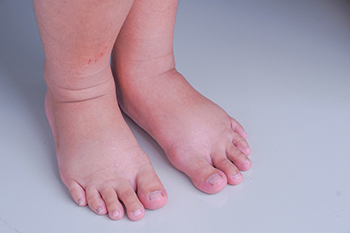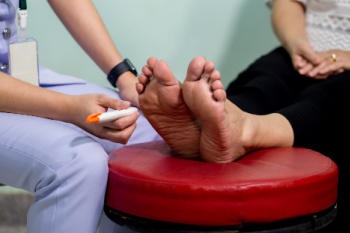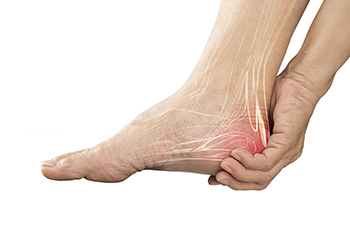Items filtered by date: April 2024
Why Do Feet Become Swollen During Pregnancy?

Swollen feet during pregnancy, a common discomfort known as edema, can affect expectant mothers due to various physiological changes. As pregnancy progresses, the body retains more fluid to support the growing fetus and prepare for childbirth. This increased fluid retention, combined with hormonal shifts and changes in blood circulation, can lead to swelling in the feet and ankles. The expanding uterus can also exert pressure on blood vessels, impeding the return of blood from the lower extremities and contributing to swelling. Additionally, the body produces more progesterone during pregnancy, which relaxes the walls of blood vessels and contributes to fluid buildup. Factors such as standing or sitting for prolonged periods, high ambient temperatures, and a diet high in sodium can also worsen swelling. While mild foot swelling is typically normal during pregnancy, severe or sudden swelling may indicate a more serious condition, such as preeclampsia, necessitating prompt medical attention. If the swelling of your feet has become a problem during your pregnancy, it is suggested that you confer with a podiatrist who can regularly monitor this condition.
Pregnant women with swollen feet can be treated with a variety of different methods that are readily available. For more information about other cures for swollen feet during pregnancy, consult with Brain Middleton, DPM from Medical Foot Care Center. Our doctor will attend to all of your foot and ankle needs.
What Foot Problems Can Arise During Pregnancy?
One problem that can occur is overpronation, which occurs when the arch of the foot flattens and tends to roll inward. This can cause pain and discomfort in your heels while you’re walking or even just standing up, trying to support your baby.
Another problem is edema, or swelling in the extremities. This often affects the feet during pregnancy but tends to occur in the later stages.
How Can I Keep My Feet Healthy During Pregnancy?
- Wearing orthotics can provide extra support for the feet and help distribute weight evenly
- Minimize the amount of time spent walking barefoot
- Wear shoes with good arch support
- Wear shoes that allow for good circulation to the feet
- Elevate feet if you experience swelling
- Massage your feet
- Get regular, light exercise, such as walking, to promote blood circulation to the feet
If you have any questions please feel free to contact our office located in Rome, GA . We offer the newest diagnostic and treatment technologies for all your foot and ankle needs.
Common Ankle Injuries in Football

Football, with its fast-paced and dynamic nature, predisposes players to a range of injuries, with ankle injuries being among the most prevalent. These injuries often occur due to sudden changes in direction, collisions with other players, or awkward landings after jumps. One common ankle injury in football is the sprained ankle, which happens when the ligaments supporting the ankle are stretched or torn. Symptoms include pain, swelling, and difficulty bearing weight on the affected ankle. Another frequent injury is the ankle fracture, where one or more of the ankle bones break due to impact or excessive force. This injury causes severe pain, swelling, and possibly deformity of the ankle. Additionally, football players may experience ankle tendonitis, an inflammation of the tendons surrounding the ankle joint, resulting in pain and stiffness. Proper warm-up, strengthening exercises, wearing supportive footwear, and adhering to proper tackling and landing techniques can help reduce the risk of these common ankle injuries in football. Ankle injuries can be painful, and disrupt completing daily activities. If you have endured this condition, it is suggested that you confer with a podiatrist who can properly diagnose and treat ankle injuries.
Sports related foot and ankle injuries require proper treatment before players can go back to their regular routines. For more information, contact Brain Middleton, DPM of Medical Foot Care Center. Our doctor can provide the care you need to keep you pain-free and on your feet.
Sports Related Foot and Ankle Injuries
Foot and ankle injuries are a common occurrence when it comes to athletes of any sport. While many athletes dismiss the initial aches and pains, the truth is that ignoring potential foot and ankle injuries can lead to serious problems. As athletes continue to place pressure and strain the area further, a mild injury can turn into something as serious as a rupture and may lead to a permanent disability. There are many factors that contribute to sports related foot and ankle injuries, which include failure to warm up properly, not providing support or wearing bad footwear. Common injuries and conditions athletes face, including:
- Plantar Fasciitis
- Plantar Fasciosis
- Achilles Tendinitis
- Achilles Tendon Rupture
- Ankle Sprains
Sports related injuries are commonly treated using the RICE method. This includes rest, applying ice to the injured area, compression and elevating the ankle. More serious sprains and injuries may require surgery, which could include arthroscopic and reconstructive surgery. Rehabilitation and therapy may also be required in order to get any recovering athlete to become fully functional again. Any unusual aches and pains an athlete sustains must be evaluated by a licensed, reputable medical professional.
If you have any questions please feel free to contact our office located in Rome, GA . We offer the newest diagnostic and treatment technologies for all your foot and ankle needs.
Diagnosing Foot Neuropathy

Foot neuropathy, a nerve disorder, presents a variety of challenges for individuals experiencing symptoms. Neuropathy occurs when nerves in the feet are damaged, leading to sensations of numbness, tingling, burning, or sharp pain. This condition can significantly impair mobility and diminish quality of life. Diagnosing foot neuropathy involves a comprehensive evaluation by a podiatrist, typically starting with a thorough medical history and physical examination. This foot doctor may perform various tests to assess nerve function and rule out other potential causes of foot symptoms, such as diabetes or vitamin deficiencies. Electromyography, or EMG, nerve conduction studies, and imaging tests, such as MRI scans or ultrasounds, may be used to confirm the diagnosis and determine the extent of nerve damage. Early detection and diagnosis of foot neuropathy are essential for initiating appropriate treatment strategies aimed at managing symptoms, preventing further nerve damage, and improving overall foot health and function. If you have any of the above symptoms in your feet, it is strongly suggested that you visit a podiatrist who can help you to manage neuropathy.
Neuropathy
Neuropathy can be a potentially serious condition, especially if it is left undiagnosed. If you have any concerns that you may be experiencing nerve loss in your feet, consult with Brain Middleton, DPM from Medical Foot Care Center. Our doctor will assess your condition and provide you with quality foot and ankle treatment for neuropathy.
What Is Neuropathy?
Neuropathy is a condition that leads to damage to the nerves in the body. Peripheral neuropathy, or neuropathy that affects your peripheral nervous system, usually occurs in the feet. Neuropathy can be triggered by a number of different causes. Such causes include diabetes, infections, cancers, disorders, and toxic substances.
Symptoms of Neuropathy Include:
- Numbness
- Sensation loss
- Prickling and tingling sensations
- Throbbing, freezing, burning pains
- Muscle weakness
Those with diabetes are at serious risk due to being unable to feel an ulcer on their feet. Diabetics usually also suffer from poor blood circulation. This can lead to the wound not healing, infections occurring, and the limb may have to be amputated.
Treatment
To treat neuropathy in the foot, podiatrists will first diagnose the cause of the neuropathy. Figuring out the underlying cause of the neuropathy will allow the podiatrist to prescribe the best treatment, whether it be caused by diabetes, toxic substance exposure, infection, etc. If the nerve has not died, then it’s possible that sensation may be able to return to the foot.
Pain medication may be issued for pain. Electrical nerve stimulation can be used to stimulate nerves. If the neuropathy is caused from pressure on the nerves, then surgery may be necessary.
If you have any questions, please feel free to contact our office located in Rome, GA . We offer the newest diagnostic and treatment technologies for all your foot care needs.
Symptoms and Definition of Kohler’s Disease

Kohler's disease, a rare foot condition primarily affecting children, involves the temporary interruption of blood supply to the navicular bone in the foot, leading to bone damage and subsequent pain. Typically occurring between the ages of 4 and 7, Kohler's disease manifests gradually, with such symptoms as localized swelling, tenderness, and difficulty in bearing weight on the affected foot. Children may also start limping or change their gait pattern as they try to alleviate discomfort. While the exact cause remains unclear, theories suggest factors such as vascular insufficiency or mechanical stress on the bone. Diagnosis often involves physical examination, imaging studies like X-rays, and ruling out other potential conditions. Treatment focuses on relieving symptoms and promoting healing, typically through rest, orthotic devices, and pain management strategies. Fortunately, most children recover fully without long-term complications, but early detection and intervention remain essential for optimal outcomes. If your child has symptoms of Kohler’s disease, it is strongly suggested that you make regular appointments with a podiatrist who can offer treatment and management techniques.
Some foot conditions may require additional professional care. If you have any concerns, contact Brain Middleton, DPM of Medical Foot Care Center. Our doctor can provide the care you need to keep you pain-free and on your feet.
Rare Foot Conditions
The majority of foot conditions are common and can be treated by a podiatrist. Standard diagnostic procedures are generally used to identify specific conditions and treatment can be rendered. A podiatrist also treats rare foot conditions which can be difficult to diagnose and may need extra attention and care.
There are many rare foot conditions that can affect children. Some of these can include:
- Freiberg’s disease
- Kohler’s disease
- Maffucci syndrome
Freiberg’s disease - This can be seen as a deterioration and flattening of a metatarsal bone that exists in the ball of the foot. It typically affects pre-teen and teenage girls, but can affect anyone at any age. Symptoms that can accompany this can be swelling, stiffness, and the patient may limp.
Kohler’s disease - This often targets the bone in the arch of the foot and affects younger boys. It can lead to an interruption of the blood supply which ultimately can lead to bone deterioration. The patient may limp or experience tenderness, swelling, and redness.
Maffucci syndrome - This affects the long bones in a child’s foot leading to the development of abnormal bone lesions. They are benign growths and typically develop in early childhood and the bones may be susceptible to breaking.
A podiatrist can properly diagnose and treat all types of rare foot conditions. If your child is affected by any of these symptoms or conditions, please don’t hesitate to call our office so the correct treatment method can begin.
If you have any questions please feel free to contact our office located in Rome, GA . We offer the newest diagnostic tools and technology to treat your foot and ankle needs.
Exploring the Realities of Heel Pain

Heel pain can stem from various underlying causes, impacting the daily activities and quality of life of people of all ages. One common reason is plantar fasciitis, which is the inflammation of the tissue connecting the heel bone to the toes. This condition often causes sharp pain in the bottom of the heel, particularly upon standing or walking after periods of rest. Achilles tendonitis, another frequent cause of heel pain, involves inflammation of the Achilles tendon at the back of the heel, typically the result of overuse or repetitive stress. Other factors contributing to heel pain include heel spurs, stress fractures, and nerve compression. Symptoms may range from mild discomfort to severe pain and may worsen with activity. Proper diagnosis by a podiatrist is critical for effective treatment and management strategies tailored to address the underlying cause of heel pain. If you have developed heel pain, it is suggested that you consult a podiatrist who can offer you a tailored treatment plan.
Many people suffer from bouts of heel pain. For more information, contact Brain Middleton, DPM of Medical Foot Care Center. Our doctor can provide the care you need to keep you pain-free and on your feet.
Causes of Heel Pain
Heel pain is often associated with plantar fasciitis. The plantar fascia is a band of tissues that extends along the bottom of the foot. A rip or tear in this ligament can cause inflammation of the tissue.
Achilles tendonitis is another cause of heel pain. Inflammation of the Achilles tendon will cause pain from fractures and muscle tearing. Lack of flexibility is also another symptom.
Heel spurs are another cause of pain. When the tissues of the plantar fascia undergo a great deal of stress, it can lead to ligament separation from the heel bone, causing heel spurs.
Why Might Heel Pain Occur?
- Wearing ill-fitting shoes
- Wearing non-supportive shoes
- Weight change
- Excessive running
Treatments
Heel pain should be treated as soon as possible for immediate results. Keeping your feet in a stress-free environment will help. If you suffer from Achilles tendonitis or plantar fasciitis, applying ice will reduce the swelling. Stretching before an exercise like running will help the muscles. Using all these tips will help make heel pain a condition of the past.
If you have any questions please contact our office located in Rome, GA . We offer the newest diagnostic and treatment technologies for all your foot and ankle needs.

